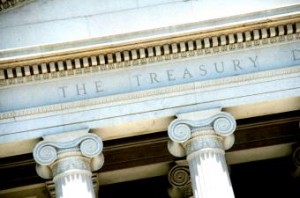 [1]A positive housing data report raised U.S. Treasury yields on Tuesday, according to a report [2] from NASDAQ Dow Jones Business News. [3]
[1]A positive housing data report raised U.S. Treasury yields on Tuesday, according to a report [2] from NASDAQ Dow Jones Business News. [3]
Author Min Zeng noted that the yield on the benchmark 10-year Treasury note was 2.196 percent, compared with 2.15 percent on Monday. She also mentioned that yields go up as prices go down.
"The 10-year note's yield, a bedrock for global finance, is trading near its lowest level since the end of April. Trading volume was lighter than usual amid the typical summer lull, which could exaggerate price moves," traders said to NASDAQ.
The report also found that short-term government debt securities, or T-bills, rose to the highest level in five years.
The yield on the one-year T-bill hit 0.39 percent during Tuesday's session, the highest intraday level since April 2010. By late-afternoon, it was 0.377 percent.
Tom Sontag, a money manager in Chicago at Neuberger Berman Group LLC which has $251 billion assets under management, said to NASDAQ that he doesn't expect a return to 5 percent levels of yield on T-bills.
"In order to get that type of yields, you need to see 3 percent plus real economic growth and 2-3 percent inflation," he said. "We are not in that environment."
Zeng also highlighted that recent mixed housing reports have caused investors to further question if the Federal Reserve will raise short-term interest rates at the next Federal Open Market Committee (FOMC) meeting in September. A rise in rates will deprecate the value of outstanding bonds, as buyers will be more attracted to new bonds.
Investors and traders see a 36 percent likelihood of a rate increase at the September meeting, compared with 45 percent on Monday, according to data from the CME Group. The odds were 26 percent a month ago.
Richard Schlanger, a money manager at Pioneer Investments in Boston, which has more than $40 billion in assets under management, said “the Fed could still tighten in September, but the global uncertainty bolstered the case that the central bank's tightening cycle would be shallow, which would prevent bond yields from rising significantly.”